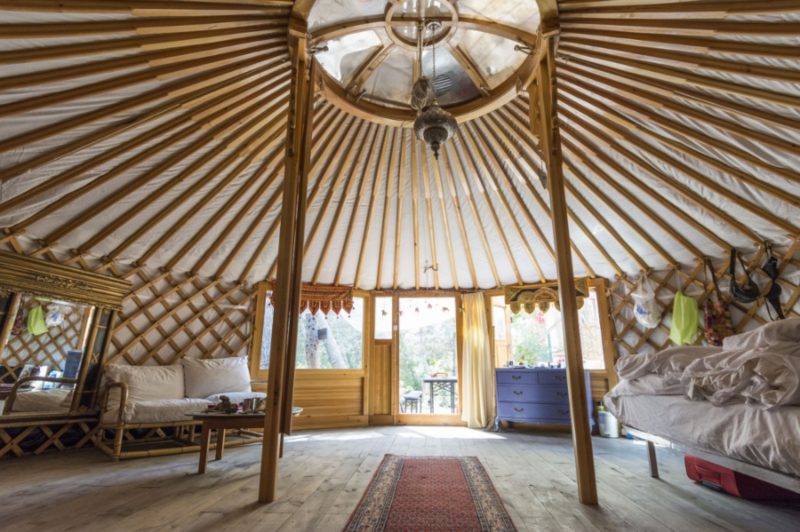Is it legal for me to live in a yurt on my own property? This is an often-asked question among individuals interested in other housing alternatives. The answer depends entirely on your unique circumstances, but the first step should be trying out which regulations apply and making sure you’re following them!
Yurts are a great way to live off the grid, but there are some restrictions. In this post, we’ll go through when you can live in a yurt on your own property and the restrictions that come with it.
Table of Contents
- Zoning Laws and Building Codes
- Size Restrictions
- Defining a Domicile
- Laws Against Living Off-the-grid
- Would Living in a Yurt Be Considered Camping?
- Consider the Pros of Setting Up a Yurt
Zoning Laws and Building Codes
Zoning laws prescribe what is permissible with respect to building materials and locations, so it’s vital to know how they apply
While your local zoning board has the final say in terms of construction standards for buildings within city limits (therefore affecting you), these guidelines might not always be relevant or applicable because some areas may have different permitting processes than others which can lead to legal consequences if violated – delaying projects rather than causing delays through spending money on permits as well!
Your first step should be getting a copy/download from their website before anything else; after doing some research into exactly where things stand legally.
Some pointers for dealing with zoning regulations:
- If you aren’t 100% certain about building your own home, get an architect or engineer’s opinion first before making any plans for construction; For more information try talking with other residents nearby who have done this project successfully (or know someone else personally) as there may be precedents permitting such use outside homes too!
- Additionally, look into what types of exemptions exist within local laws regarding accessory dwelling units- these include backyard cabins and even open-air shelters like solar pitching tents which don’t require special permits if erected properly
- For newcomers, check before you start living there, make sure you are in compliance with your state’s permanent residency regulations.
Size Restrictions

What’s the minimum required space for an off-grid domicile?
In America, it depends on where you live. There are some states with more lenient zoning restrictions than others and in those cases, 500 square feet will do just fine! In a lot of counties though 1k+ is common so make sure before investing too much time or money into building your own home that what type balancing compromise between size requirements and cost when considering solar power installation considerations as well as other environmental factors like water availability (or lack thereof).
Defining a Domicile
One of the more difficult aspects of living in a tiny home is that you must maintain your domicile status. A domicile is defined as one’s permanent home, where they are physically present most of the time. It can be considered either temporary or permanent and have different consequences depending on where it’s located, but there are some restrictions regulated by legislation to make sure people aren’t taking advantage of these types of housing options available only within their state borders
In America alone we’ve seen how certain laws might not allow yurts/tiny houses built off the private property as official dwellings due to size limitations (more than 40 square feet) along with proximity issues between amenities nearby – this impacts even those who own multiple properties!
Laws Against Living Off-the-grid
If you’re thinking about living off the grid, make sure that it’s legal in your state and city. More counties require homes to be hooked up with public utilities like gas, electricity water or sewer services so check first if this is something for which there are restrictions where you want to go before building anything yourself!
The United States has many different laws regarding how people can live without these necessities but when looking at America as a whole – most states don’t allow anyone (residents) who isn’t homeless or under very specific circumstances to live without these utilities so consider the location before building your own home.
Would Living in a Yurt Be Considered Camping?
In practice, these laws are frequently created and enforced in certain cities as a means of pushing homeless individuals away or restricting them to certain places. Long-term camping on one’s own property is quite common in rural areas.
Setting up your yurt in a manner that classifies it as a tent rather than a permanent building may help you get around many of the rules. Some cities, however, have laws against living in tents, even on one’s own property. While you are unlikely to be fined for constructing a modest play tent for your children in the backyard, a dwelling-sized yurt with a cot, table and chairs might raise some eyebrows.
Quietly ask your solicitor to check if there are any laws against living in a tent longer than 30 days, or 60 days, etc.
Consider the Pros of Setting Up a Yurt
Would you be happier living in a tent or constructing your own yurt? If so, which option is more appealing. Tents are less formal and practicality-wise can also give the feeling of freedom with any outdoor lifestyle but there’s always an issue when considering what would get easier legal permission from authorities as well if this interests you at all!
Conclusion
The yurt is a relatively new type of residence, and there are no laws specifically prohibiting the construction or use of them. It depends on your state, county laws, zoning codes, property lines/boundaries, homeowners association rules, etc. There are many factors that you need to take into consideration before deciding whether or not it’s possible for you to live in a yurt on your own land. You should consult with an attorney before taking any steps towards building a yurt at all!
